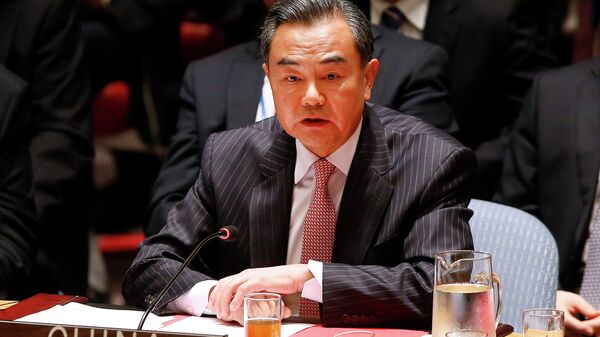MOSCOW, December 22 (Sputnik) — Chinese Foreign Minister Wang Yi told his US counterpart John Kerry by phone on Sunday that China opposes all forms of cyber-attacks and cyber terrorism, but made no mention of North Korea, which the US blames for a recent attack on Sony Pictures, Xinhua reported.
The commentary follows continuing fallout from a cyber-attack on Sony Pictures Entertainment last month, which combined with recent threats of terrorist violence, resulted in Sony’s canceling of the release of 'The Interview', a lowbrow comedy about a plot to kill North Korean leader Kim Jong Un.
According to a Chinese Foreign Ministry statement summarizing Wang’s conversation with Kerry, "China opposes all forms of cyber-attacks and cyber terrorism…[and] opposes any country or individual using other countries’ domestic facilities to conduct cyber-attacks on third-party nations."
The statement follows a commentary by a Chinese Embassy spokesman in Washington late last week that "Chinese laws prohibit cyber-crimes of all forms and [the] Chinese government has done whatever it can to combat such activities. Any individual is not allowed to commit cyber illegalities in any part of China," Reuters reported.
The US had asked China and other countries for help in preventing such attacks in the future, but some media commentators have noted that the Chinese Foreign Ministry statement’s failure to mention North Korea is a sign that China has tacitly sided with Pyongyang over the incident. The International Business Times cites an editorial in the People’s Daily-run Global Times, a Chinese daily tabloid, which severely criticizes 'The Interview', and notes that "the vicious mocking of Kim is only a result of senseless cultural arrogance" by Hollywood and US society. "No matter how US society looks at North Korea or Kim Jong-un, Kim is still the leader of the country," the editorial noted.
North Korea has denied the allegations of US government officials; the North Korean news agency Korean Central News Agency states that "we do not know who or where they [the hackers] are but we can surely say they are supporters and sympathizers with the DPRK." Earlier this month, an unnamed North Korean diplomat told The Guardian that "linking [North Korea] to the Sony hacking is another fabrication targeting the country. My country publicly declared that it would follow international norms banning hacking and piracy."
Late last week, an unnamed source in US intelligence told Fox News that the malware used in the hack attack was at a level of sophistication previously unknown for North Korea, and that the final state of the attack may have been initiated outside North Korea.
President Barack Obama told CNN’s State of the Union program on Sunday that his administration would consider placing North Korea back on the list of state sponsors of terrorism, from which it was removed in 2008. "I’ll wait to review what the findings are," he explained, noting that he did not think the hacking was "an act of war," but rather "an act of cyber vandalism that was very costly, very expensive. We take it very seriously. We will respond proportionately," Reuters explained.
As expected, Republicans criticized Obama for his response to the attack. Incoming Republican Chair of the House Intelligence Committee Mike Rogers criticized the president for going on vacation to Hawaii, and noted the need for tough measures against North Korea. "I would argue you’re going to have to ramp up sanctions. It needs to be very serious. Remember – a nation-state was threatening violence," Reuters quoted him as saying. Meanwhile, former Speaker of the House of Representatives Newt Gingrich tweeted that Sony Pictures’ pulling of the film was a sign that "America has lost its first cyberwar," and that "this is a very, very dangerous precedent."
The cyber-attack on Sony Pictures Entertainment late last month resulted in the theft of 11 terabytes of information, including company and employee records and unreleased movies. The hack, combined with threats of terrorism against theatres which planned to show 'The Interview', led to the cancellation of its release. North Korea had earlier called the film a "most undisguised sponsoring of terrorism as well as an act of war."


